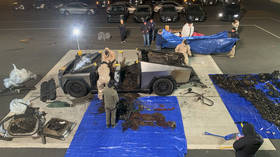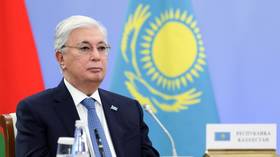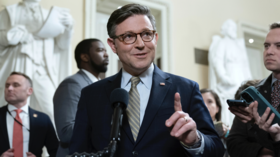ROAR: US makes “small step” limiting its right for nuclear strike

Russian media and analysts are commenting on a new US nuclear policy unveiled by President Barack Obama as Moscow and Washington prepares to sign a new START treaty.
In the updated Nuclear Posture Review, the US narrows the range of targets against which nuclear weapons can be used. At the same time, Washington reserves the right to strike first even against non-nuclear states.
“Barack Obama has limited the right of Pentagon to use its nuclear arsenal,” Rossiyskaya Gazeta daily said. "According to the new policy, the possible use of nuclear weapons has been significantly reduced,” the paper reported.
The US also gives additional guarantees to the states that do not have nuclear weapons and observe non-proliferation agreements that they will not be attacked, the paper said. The main goal of the new strategy is to prevent nuclear terrorism, but “the arsenals that remain from the times of the Cold War are not suitable to solve this problem,” the paper noted.
Pentagon will have to counter the acts of aggression with conventional weapons, the daily noted. But the countries that do not observe non-proliferation agreements could be attacked with nuclear weapons, it added.
“First of all, this concerns Iran and North Korea,” the paper said, “because the new strategy does not contain the refusal of the preventive strike.” The document does not describe nuclear weapons as the ultimate deterrent, it noted.
The US nuclear doctrine excludes the possible strike on non-nuclear states, but “Barack Obama is not ready for bigger concessions,” Vedomosti daily noted. Washington, however, expects that other countries will follow the US’s example to introduce limitations, the paper said.
Obama hopes to persuade Russia to continue reducing nuclear weapons, the daily noted. The US doctrine was published two days before the signing of a new START treaty that should take place in Prague on April 8.
Next week, the heads of more than 40 states will discuss nuclear security measures in Washington. “The summit is being held on the initiative of Obama, who made nuclear disarmament one of the key issues during his election campaign,” Vedomosti wrote.
The previous US doctrine in this sphere was adopted by President George W. Bush in 2002. The most serious change now is “the refusal of the strike against non-nuclear states that have chemical and biological weapons,” believes Yevgeny Myasnikov from the Center for the Studies of Disarmament.
Many analysts however, expected more of Obama’s decision, the analyst said. The president was expected to leave nuclear weapons as deterrent only, Myasnikov told Vedomosti. “But it seems that the military have managed to avoid such a narrow interpretation.”
Other analysts think that Obama did not go further because he may be concerned over the ratification of the START treaty in the Congress, the paper said.
Another daily, Kommersant, note that the doctrine that was awaited for four months, declares that the US “is changing priorities of the American military strategy. The US is no longer preparing for a full-scale nuclear war, and considers nuclear terrorism and uncontrolled proliferation of weapons of mass destruction the main threat,” the paper said.
“Western experts describe the document as a political compromise between Pentagon and the White House, while Russian analysts see it as ‘a small step’ in decreasing the role of the nuclear weapons in the US’s military strategy,” the daily said.
Although a year ago Obama called the full destruction of nuclear weapons in the world the main priority of his administration, the new strategy underlines the need to keep the American triad – intercontinental ballistic missiles, strategic bombers and submarines – for an uncertain period, the paper noted.
“However, unlike the doctrine adopted by the administration of George Bush in the end of 2002, the new doctrine does not assume the participation of the United States in a full-scale nuclear conflict,” it said.
“For the first time it is suggested that the threats from non-nuclear states should be countered only with the use of conventional weapons, even if the attack is conducted with chemical, bacteriological or cyber weapons,” Kommersant said, adding that the US possess enough possibilities for this.
Analysts mention such means of countering aggression as missile defense systems deployed in the Persian Gulf, near Iran’s nuclear facilities, the paper noted. The Quadrennial Defense Review, published in February, contained provisions about the financing of the development of new class of missiles capable of reaching targets at any point of the world within less than an hour, it added.
Launch pads for these missiles will be available for international inspectors, including those from Russia, the daily added. They will be able to see that these missiles do not carry nuclear weapons, it noted.
Although nuclear weapons remain the instrument of deterrent, the US reserves the right of the first strike, “if the level of development of chemical or bacteriological weapons is considered dangerous for US security,” the daily said.
Several European countries expected that the US would be withdrawing nuclear weapons from their territories, but the Nuclear Posture Review does not mention it, the paper noted. More than 200 US warheads are still deployed in Belgium, Turkey, Italy, Germany and the Netherlands.
This issue is worrying Moscow, and the deputy secretary of Russia’s Security Council, Yury Baluevsky, noted that “the US nuclear tactical weapons in Europe present a strategic threat to Russia,” the paper said.
The US also has infrastructure in Europe, in particular, in the Baltic countries, for deploying tactical weapons, believes Anton Khlopkov, director of the Center of Energy and Security. “Thus, the flying time to our territory may be reduced, which leaves little time for the Russian leadership to make decisions,” he told the paper.
At the same time, Russian analysts are treating the new US doctrine positively, the paper noted. It is possible for the US possessing effective conventional weapons “to make a small step in reducing nuclear arms,” Khlopkov believes. Developing its own nuclear doctrine, Moscow, which does not have the same potential of conventional weapons, “was on the verge of going in the opposite direction,” he added.
Russia’s new doctrine also very carefully deals with the situations where the use of nuclear weapons is possible, said Aleksey Arbatov, head of the Center for International Security at the Institute of World Economy and International Relations. They include the response to an aggression with the weapons of mass destruction and aggression with conventional weapons that threatens to the existence of the Russian state.
As for the non-nuclear deterrent, the US “does not plan to wage a full-scale war using high-precise weapons against Russia,” Arbatov told Nezavisimaya Gazeta daily. “Washington has no doubts that Russia will use nuclear weapons in this case.”
This kind of deterrent is rather aimed against third countries, rogue states or countries that threaten with aggression to their neighbors, the analyst added.
Obama supports nuclear disarmament for two reasons, Arbatov believes. "The US will not strengthen non-proliferation unless Washington itself does not make steps in this direction. And the Americans believe that “the fewer nuclear weapons the less is danger to the US,” the analyst said. “As long as nuclear weapons exist, the accidental exchange of strikes is not ruled out,” he added.
Sergey Borisov
Russia Opinion and Analytics Review, RT












